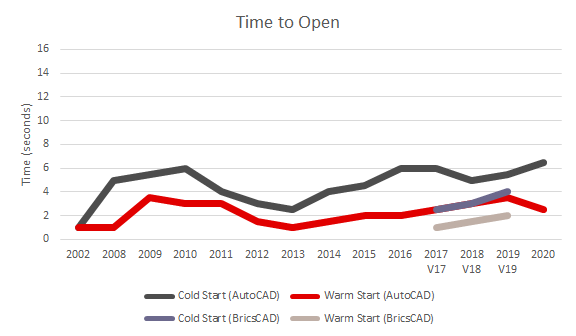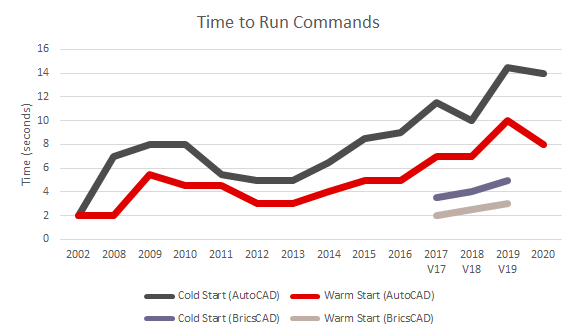In 2011, we tested the startup performance of AutoCAD 2012 against earlier versions to determine whether it started faster than its predecessors. The following year, we compared the startup performance of AutoCAD 2013. This year, we decided to bring the startup performance test back for AutoCAD 2020. For good measure, we also included BricsCAD to see how its startup speeds compare to AutoCAD.
The results: Overall, each AutoCAD version loads slower than the versions before it. The same is also true for BricsCAD, but each version starts up faster than the equivalent AutoCAD version.
Each AutoCAD version from AutoCAD 2020 to AutoCAD 2008 was tested, as well as AutoCAD 2002. BricsCAD V17 Platinum, BricsCAD V18 Platinum, and BricsCAD V19 Platinum were also tested.
Times were recorded for a cold start — opening the program after a computer restart — and a warm start — opening the program after it has already been opened during the session, which is typically faster than a cold start. Times were taken at two points during startup: the time it takes for the program to open, and the time it takes to be able to execute commands. Times were rounded to the nearest half-second.
The methodology is explained in greater detail at the bottom of this post.
Time to Open
As shown in the graph and table below, the time it takes AutoCAD to open decreased from AutoCAD 2010 through AutoCAD 2013, but has trended upward for each version since. BricsCAD also shows an upward trend but each version outpaces the equivalent version of AutoCAD.

| Cold Start | Warm Start | Cold Start | Warm Start | |
|---|---|---|---|---|
| AutoCAD 2002 | 1 second | 1 second | ||
| AutoCAD 2008 | 5 seconds | 1 second | ||
| AutoCAD 2009 | 5.5 seconds | 3.5 seconds | ||
| AutoCAD 2010 | 6 seconds | 3 seconds | ||
| AutoCAD 2011 | 4 seconds | 3 seconds | ||
| AutoCAD 2012 | 3 seconds | 1.5 seconds | ||
| AutoCAD 2013 | 2.5 seconds | 1 second | ||
| AutoCAD 2014 | 4 seconds | 1.5 seconds | ||
| AutoCAD 2015 | 4.5 seconds | 2 seconds | ||
| AutoCAD 2016 | 6 seconds | 2 seconds | ||
| AutoCAD 2017 | 6 seconds | 2.5 seconds | ||
| BricsCAD V17 Platinum | 2.5 seconds | 1 second | ||
| AutoCAD 2018 | 5 seconds | 3 seconds | ||
| BricsCAD V18 Platinum | 3 seconds | 1.5 seconds | ||
| AutoCAD 2019 | 5.5 seconds | 3.5 seconds | ||
| BricsCAD V19 Platinum | 4 seconds | 2 seconds | ||
| AutoCAD 2020 | 6.5 seconds | 2.5 seconds |
Time to Run Commands
Similar to the open time, the time it takes for AutoCAD to accept commands decreased from AutoCAD 2010 through AutoCAD 2013, then increased in later versions. However, as the graph and table below illustrate, the time increase has gotten significantly higher compared to the increase in start time. The trend for BricsCAD is similar to that of the time it takes to open — moving upward, but still well below AutoCAD times.

| Cold Start | Warm Start | Cold Start | Warm Start | |
|---|---|---|---|---|
| AutoCAD 2002 | 2 seconds | 2 seconds | ||
| AutoCAD 2008 | 7 seconds | 2 seconds | ||
| AutoCAD 2009 | 8 seconds | 5.5 seconds | ||
| AutoCAD 2010 | 8 seconds | 4.5 seconds | ||
| AutoCAD 2011 | 5.5 seconds | 4.5 seconds | ||
| AutoCAD 2012 | 5 seconds | 3 seconds | ||
| AutoCAD 2013 | 5 seconds | 3 second | ||
| AutoCAD 2014 | 6.5 seconds | 4 seconds | ||
| AutoCAD 2015 | 8.5 seconds | 5 seconds | ||
| AutoCAD 2016 | 9 seconds | 5 seconds | ||
| AutoCAD 2017 | 11.5 seconds | 7 seconds | ||
| BricsCAD V17 Platinum | 3.5 seconds | 2 seconds | ||
| AutoCAD 2018 | 10 seconds | 7 seconds | ||
| BricsCAD V18 Platinum | 4 seconds | 2.5 seconds | ||
| AutoCAD 2019 | 14.5 seconds | 10 seconds | ||
| BricsCAD V19 Platinum | 5 seconds | 3 seconds | ||
| AutoCAD 2020 | 14 seconds | 8 seconds |
Method
For each version of AutoCAD and BricsCAD, a Lisp file was added to the startup suite that had two functions: outputting the time to the command line as soon as the program opened, and defining a command that would output the time to the command line. The software was opened through a batch file that also logged the time. Each version was configured to open to a new drawing immediately with no startup dialogs. Each execution time, open time, and command time was recorded, rounded to the nearest second, to determine the elapsed time.
Times were taken twice for each version and start type, with the result being the average of the times.
System Specs:
- Operating System: Windows 10 Pro
- Processor: Intel i7-8700K @ 3.70 GHz
- RAM: 32 GB
- Hard Drive Type: SSD
